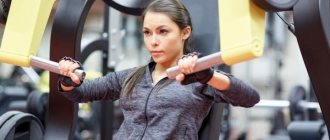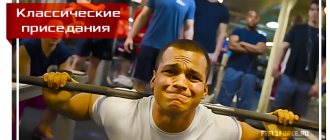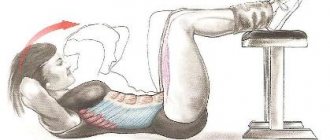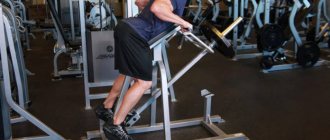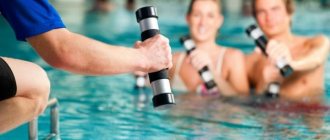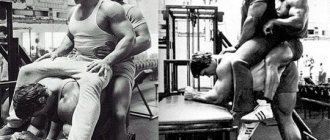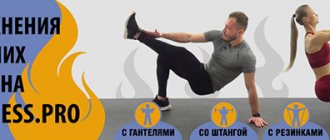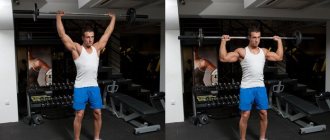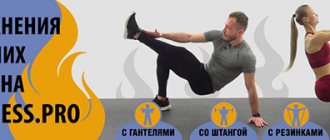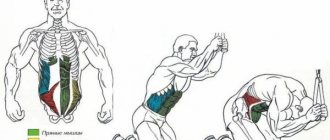Nuances of technology
Performing the exercise
You need to return the weight to its original position without jerking or sudden movements. Unclench your legs slowly, without releasing the tension, but not bringing it just a little to the starting position.
An excellent warm-up before exercise and in between approaches would be to use the Lotus pose, due to which the adductor muscles will be sufficiently stretched and always toned. During performance, it is strictly forbidden to move your body or slide your buttocks on the saddle.
Due to its good auxiliary effect, the training should be performed last in the training complex. If during the final approach fatigue does not allow you to complete the exercise properly, then you can switch to a series of shortened repetitions.
A few notes to improve your technique:
- do not bend your back like a wheel and do not lower your head, otherwise you may lose your breath;
- the legs should rest firmly on the machine, with the main support placed on the heels;
- for a more comfortable position on the simulator, it is possible to change the angle of the backrest;
- Failure to keep your knees and feet level will result in improper load distribution.
There are times when the gym does not have a specialized exercise machine, or beginners cannot withstand the load. Then the question arises: what can replace the movement of the legs? A good and very affordable analogue is steps with a rubber band to the sides.
This exercise targets the same muscles without compromising effectiveness. You can also use various types of squats (split, plie), lunges, crossovers, etc. All these exercises can be done at home, if, of course, there are all the conditions for this.
What muscles work
What muscles work
Leg abduction belongs to the category of formative and auxiliary exercises. The targeted muscles, as already mentioned, will be the gluteus medius and adductor. The main benefit is that the adductor muscle plays a passive role in everyday life.
The same can be said about the gluteus medius muscle, which often “transfers” the entire load to adjacent muscles. The exercise isolates the target muscle group, forcing them to work harder than usual without connecting the auxiliary zones.
An increase in volume, of course, occurs, but this is not the goal in itself of this exercise. The main emphasis is on strengthening weak areas that are almost impossible to train in everyday life or on other simulators. A warm-up warm-up plays an important role in the effectiveness of training. It will help activate the production of joint fluid, which will act as a “lubricant” for the joints, and will minimize the likelihood of damage.
It has already been said about the isolating nature of bringing the legs together, however, we should not forget about the work of the stabilizing muscles. In this case, the quadratus lumborum, abdominal, and adductor muscles will act as stabilizers.
What muscles work when you raise your legs in the simulator?
It is important to understand that in different variations some muscles will work more strongly and others less. By changing the inclination you can also target different parts of the muscles. In the technique of performing the exercises, we will consider these features in more detail.
The main load is received by:
- Gluteus medius.
- Gluteus maximus.
- Gluteus minimus (internal muscle).
Exercises for the gluteus medius muscle to lift the top of the buttocks →
Auxiliary muscles that are involved in the work:
- Tensor fascia lata.
- Piriformis muscle.
- External oblique abdominal muscle.
- Rectus abdominis muscle.
- Vastus lateralis muscle.
- Rectus femoris muscle.
- Quadratus lumborum muscle.
Leg extensions in a machine is the criticism of this exercise justified?
If you talk to bodybuilders about the machine leg raise exercise, you will most likely hear that it is completely useless. But this only reveals the incompetence of the one who says so. There are no useless exercises - there are those who do not know how to perform them correctly and combine them with others.
Why is there so much negativity towards leg raises? There are some reasons for this. Firstly, the main muscle that is involved is the gluteus medius, and this muscle is not particularly large. It’s quite difficult to pump it up, so your butt won’t become much rounder. Secondly, the middle gluteus will spend much less energy than the large gluteus, so the effect for fat burning is also not the best.
So why is this exercise needed and who should do it?
- For beginners who simply cannot handle the heavy compound exercises that produce the strongest anabolic response. To bring the muscles of the butt into sufficient tone for more difficult work - quite good.
- Girls (and this exercise is traditionally considered female) who have already acquired a figure close to ideal with the help of fitness, but it needs polishing. It happens that it is the gluteus medius muscle that lags behind, and it still needs to be “pumped up”.
These are the ones who will need it the most. But in general, this exercise is good to use as an auxiliary exercise - for preliminary fatigue or “finishing off” the gluteal muscles. So, when performing the exercise, the following are involved:
- gluteus medius (main);
- gluteus maximus (auxiliary);
- tensor fascia lata (auxiliary).
Shifting emphasis allows you to use one or the other to a greater extent.
Execution technique
Set a comfortable weight. It's better to start with one tile. Sit in the exercise machine, place your feet on the footrests, rest the lateral surface of your thighs on the “pads”, which, in fact, need to be spread apart. Lean your back on the back of the seat, bend your lower back, and inhale. As you exhale, with a powerful effort, spread your legs to the sides, overcoming the resistance of the simulator. Pause for a split second in the maximum extension position. As you inhale, bring your legs back together, always with a controlled movement, and not succumbing to the pressure exerted by the “pads.”
Everything is very simple. No additional equipment other than regular sportswear is needed. The likelihood of getting injured tends to zero - exercises in machines where there can be only one trajectory of movement are safe.
Accents in execution
If the machine allows you to change the angle of the backrest, experiment with it. The further you tilt it back, the better the gluteus minimus and medius muscles will engage. If you place it straight, then part of the load will fall on the top of the gluteus maximus muscle. This effect will be enhanced if you bend forward - this will stretch the muscles a little more. A good practice is to additionally contract the muscles at the moment of maximum hip extension.
Useful tips
Since this exercise is largely isolating and uses fairly small muscles, there is no point in doing it in a strength mode, when you can handle 6-10 repetitions. It is for multiple repetitions of 12-15 times. You can add a tile if you have already done it 25 times, but there is no severe fatigue or burning sensation in the muscle yet. As we already wrote above, leg extensions in the simulator are an auxiliary exercise and can be combined well with others into supersets and trisets.
For example, if you perform it 20 times with a peak contraction of the gluteals, so that they get slightly tired, and after that go for the Romanian deadlift (aka “dead”, aka with almost straight legs), the second basic exercise will more accurately hit the target muscle group. You can also leave it for the very end of the workout, when there is no longer any strength or coordination left to perform technically complex exercises.
Especially fanatical adherents of intense training use the exercise for ... rest between more complex approaches. This approach is, in principle, also possible.
Dilution is also useful for circuit training aimed at burning fat. Since they are carried out using the “one exercise after another without rest” method, a person gets tired quickly, and it is difficult for him to do something complex. In this case, the most energy-consuming and demanding tensions of the central nervous system are placed at the beginning of the “circle”, and this is at the end. It helps not to reduce the intensity, but partially relieves the load.
How to replace leg raises in the simulator
The situation when the necessary simulator is busy is very common. You shouldn’t change your training program because of this: you can work the outer thighs without it.
Leg abduction on a block
To take the starting position, position yourself with your left side to the pulley machine. Attach a cuff connected to the lower block fastening to the right leg. Holding the handles of the device, move away to a distance at which the cable is in a taut position.
- Taking a deep breath, as you exhale, with a powerful effort, move your leg to the side and up.
- At the top point, take a short pause, accompanied by an additional contraction of the target muscles.
- With a controlled movement, return to the starting position.
- After the required number of repetitions on the right leg, similar actions follow on the left.
Perform 12–15 repetitions on each leg in 3 sets.
When performing, you need to maintain a level body position and not use the force of inertia. It is important to select the weight in such a way that you can perform the movements technically competently.
m
Fat burning effect
According to statistics, all individuals of the fair sex answer the question “How will bringing your legs together on an adductor machine help you?” They answer that their goal is to burn fat, those unpleasant and unaesthetic inner “ears” on the thighs. But they were all severely disappointed after a short educational program, since the simulator itself and the exercise are intended only to strengthen the internal adductor muscles of the legs.
Burning fat requires a completely different approach. And even if you manage to burn a certain amount of calories while you work on the adductor machine, you will not be able to burn fat locally (in a separate area of the body).
So, the conclusion: working on the adductor machine, the hips will not become smaller, but they will gain some muscle strength and elasticity.
What is leg abduction in a simulator?
This exercise is simple, and it’s almost impossible to make a mistake when doing it. It represents the movement of the legs relative to the body. Initially, the hips are spread apart, then they need to be brought closer to each other, overcoming the resistance of the rollers. The information in the simulator does not apply to all movements required. They do not train the entire thigh area or promote fat burning or weight loss, so they must be performed in conjunction with other exercises.
Such simple auxiliary movements are quite within the power of girls with any physical fitness. All you need is to choose the right load that suits your capabilities. The exercise is especially effective if combined with leg extensions. To do this, you will need the same machine to use different muscles.
Technique for performing leg reduction while sitting in the exercise machine
To begin with, it is important to set up the simulator correctly. There are designs for simultaneously bringing and spreading the legs, and separately. To perform the abduction of the legs, the pads for supporting the knees must be connected to each other.
- Sit in the machine, pressing your pelvis and lower back tightly to the seat. It is necessary to tense your abdominal muscles to prevent excessive arching in the lower back.
- Place your feet on special footrests.
- There is a lever on the side of the seat that fixes the position of the legs. It is necessary to pull it up, and while holding it, spread your legs to the sides to the maximum, lower the lever and fix your legs in the abducted position.
- As you exhale, you need to bring your legs towards each other, straining the adductor muscles of the thigh.
- As you inhale, you need to slowly move your legs to the sides, without lowering the plate all the way, that is, tension should remain in the muscles.
Important: after finishing work, many people make one mistake. You only need to pull the locking lever in the position when the simulator plates are lowered and not suspended. Therefore, pull the lever with your legs as far apart as possible, when the plates touch each other. Otherwise, the plates are abruptly dropped, which spoils the integrity of the simulator and causes discomfort to others when there is a loud bang from the weight.
Basic mistakes and useful tips
For the training to be most effective, the following recommendations must be followed:
- While performing the element, keep an eye on the body - it should always be straight. Also avoid any displacement of the back relative to its original position.
- Your legs should be spread as far apart as possible.
- You need to spread your legs powerfully, and bring them together slowly and under control - there should be pressure, not a contraction by inertia.
- There is no need to bring the limbs down to the end; there should be a small gap that maintains muscle tension.
- At the end point you need to pause and perform a peak contraction.
- Hands should always be placed on the side handles.
- Follow the breathing technique: exhale with effort - dilation, inhale - with reduction.
- Make sure that during the training process only the hip joints work. The ankle and knees should not be involved.
- Try to keep your toes pointed outward at all times, so your buttocks will receive the most stress.
- Watch the outer surface of the thigh - it should touch the machine tightly. Otherwise, the load will transfer to the quadriceps.
- Choose the right weight. It shouldn’t be too heavy, but you also shouldn’t leave the exercise machine without being tired. The optimal weight will be at which the last repetitions are difficult and with a burning sensation in the muscles.
What muscles are involved?
When spreading the element, the hips and buttocks are involved. Let's find out which muscles are included, we should look at the list in more detail:
- Muscles in the lower back.
- Side press.
- Upper buttock muscles.
- Literal and large muscles.
- Vertebral muscles.
Tips for Maximum Benefit
- The angle of bending of the legs during the approach is ALWAYS the same - 90 degrees or more;
- movements are smooth, at a moderate pace, you should not “throw” the weight in the second half of the movement or perform it “with a kick” at the maximum point of tension, this will protect your muscles, ligaments and joints from injuries, bruises and sprains;
- do not bring your legs to the starting position, this will keep the adductor muscles in constant tension, which will give maximum productivity;
- at the final point (legs brought together as close as possible), hold for a few seconds, while straining the abductors, this will increase blood flow to the muscles and increase the strength of static weight retention by the hip joint;
- do not slide your back and hips on the seat, maintain your posture;
- During the rest period between approaches, you should stretch the leg muscles, not allowing them to “cool down”; stretching is guaranteed to reduce the likelihood of injury by 90-95 percent.
- the maximum effect can be achieved by including leg reduction in supersets, it will play the role of a “finisher”, for example, lunges to the side with weight – leg reduction;
- if you can't complete the last scheduled reps, quickly reduce the weight and finish the set by doing a few more reps with a lighter weight;
- It’s worth performing 10-15 repetitions in 3-5 approaches, since the exercise is isolation.
Useful tips
To get the maximum benefit from your classes, you need to take into account some subtleties that can easily be overlooked, namely:
- After dilution, you should not return to the “full” starting position. Here you need to smoothly spread your legs, preventing a return to the start.
- Between approaches, you can help the muscles stretch, for example, take a lotus position and, pressing your hands on your knees, pull the muscles - these will be the same ones that work on the machine.
- As you perform each subsequent repetition, do not move around in your seat, keep a stable position.
This exercise will be an excellent final chord when working on the adductor muscles. It should be performed at the end of the workout.
Peculiarities
This exercise does not work on its own, but in combination. If you look at the muscle atlas, it becomes obvious that the main load here falls on the abductors - the abductor muscles of the hips. It is no coincidence that a machine is installed nearby in the gym, where the load falls on the adductors - the adductor muscles.
Instead of resting between sets, it is better to switch from one machine to another: this way the workout will be continuous and tone both types of muscles almost simultaneously. For the best effect, add isolated exercises for the gluteal muscles to the superset.
Those who practice fat-burning circuit training consider this machine as a recreational option. Since this is an easy load for a woman (compared, for example, to pumping triceps and doing push-ups), she goes to the machine to rest between more energy-intensive exercises.
Men should also pay attention to this machine as an alternative to barbell squats and bench presses (if these exercises are not indicated). And also as a warm-up option before a serious set working the lower body
Execution technique
The structure of the exercise is not the most difficult and allows beginner athletes to practically not make mistakes. The physiology of adduction causes a part of the body (in this case the legs) to move towards the center. Sitting on the machine, the athlete tries to bring his hips together, overcoming the resistance of the mechanism.
The technique of bringing the legs together in the simulator itself is very simple and consists of several main elements:
- Before the start of the lesson, the required weight is installed on the simulator. The design allows you to manually adjust the width of the seat until the tension of the adductor muscles is felt, but you should not overdo this component. Keep your back in an upright position, firmly pressed against the back of the mechanism. With your legs bent at approximately right angles, you need to grab the lower handrails with your hands. Spread your legs to the width at which the exercise machine was installed.
- Next you need to take a deep breath. As you exhale, begin squeezing your thighs. Do not bend or twist your legs. Your knees should be level with your feet. What is it for? To prevent the load from going in the wrong direction. Draw your hips and knees as close to each other as possible. After this, maintain the tension for 1-2 counts.
- The rollers of the exercise machine should be opened while exhaling. When returning your legs to their original position, stop so as not to lose the load on the muscles being trained. Repeat the exercise a certain number of times without losing momentum or losing your breath.
Tips and tricks
There are several useful nuances that you need to know to get the maximum benefit from the exercise.
- When returning your legs to the starting position, do it slowly. This will give the target muscles a greater load;
- The buttocks should be pressed tightly against the machine and not move away from it while performing the movement;
- The exercise should be performed at the end of the workout to “finish off” the legs;
- If you do not have enough strength to perform the exercise in full amplitude, then you can help yourself with your hands;
- For the final set, lower the weight and perform a series of quick reps. Do this until you can't do the repetition even without weight.
If your gym does not have a machine to perform this exercise, or you experience discomfort from it, then you need to know how to replace the leg curl in a sitting machine. The adductor muscles are not involved in such a large number of exercises, especially if we talk about their isolated work.
However, you can use sumo squats or plie squats as a substitute. These are basic exercises that activate a large array of muscles, and each of them uses the hip adductors. In addition, you can try performing leg adductions on a vertical block. This is another isolated exercise designed to work the adductor muscles well. If you want to do the workout at home, you can use the leg adduction while lying on your side.
Leg abduction in the simulator
One of these weight blocks is a leg extension and/or leg abduction machine, which loads the muscles of the outer or inner thighs, respectively. Since this particular area of the legs requires special attention for many girls, training that strengthens the inner thigh muscles is also popular.
The hip adduction machine (as it is called bureaucratically correctly) serves to strengthen, as the name suggests, the adductor muscles of the thigh, deeply hidden by other muscles of the inner thighs. In everyday life, these muscles are little used, so training them will help the above areas of the legs acquire a toned appearance. Gait and posture also improve, and the risk of injuries that can be caused by weak hip muscles is reduced.
You need to set the required weight on the stack of the simulator. The saddle should be adjusted so that the adductor muscles are slightly stretched in the starting position. Keep your back pressed against the back of the seat and straight. Hands should hold onto the lower handrails, legs should be bent at the knees to approximately a right angle. As you exhale, bring your legs together, keeping them straight, with your knees vertical above your feet.
At the final point, bring your legs together as much as possible and stay like that for 1-2 counts. Then, as you exhale, slowly spread your legs and stop, slightly short of the starting position, in order to maintain tension in the working muscle. Repeat as many times as required.
Tips for achieving maximum effectiveness from the leg abduction exercise: do not suddenly release the weight, returning the legs to the starting position; between approaches, continue stretching the adductor muscles, for example, in the lotus position, pressing on your knees with your hands; During the exercise, the body must be motionless.
Correct technique in the simulator
Indeed, the exercise is suitable for beginners, since working with the simulator is quite easy. However, a little preparation is required. First, choose the minimum weight. For men, 20 kilograms for each side is suitable, but for girls, 15 kg. Select the pancakes in such a way that you can complete the exercise for 15 repetitions. Please note that correctly selected weight is a successful final approach. Watch the animation with the photo below.
Detailed diagram:
- We sit with our buttocks in a special exercise machine, rest our lower back, and direct our hips to the sides. Press the pillows tightly with your thighs. Keep your back straight and your chest facing forward.
- Then we inhale the air and try, strain your stomach, and while exhaling, press the pillows of the exercise machine on the sides. Try to hold the final phase for two seconds.
- The last stage will be returning to the starting position. Return the hips to the beginning.
- Complete 15 reps. The break is no more than 45 seconds. If you don't have enough rest, try resting for one minute. Four sets will be enough.
Breeding legs in the simulator technique
To begin with, set the weight. For men approximately 25-30 kg, for women - 12-20 kg. First, an intermediate one is established, after performing 10 control dilutions with the legs, it is corrected. If the final takes provoked a burning sensation in the muscles, the weighting was chosen correctly. Although in this case weight does not play a key role. The main thing is to follow the rules of movement.
- Sit in the exercise machine, pressing the outer surfaces of the thighs against the side supports.
- Grasp the handles, straighten the shoulder girdle and torso. In this position, the body weight involuntarily shifts to the sit bones.
- With a tense press, while inhaling, calmly move the limbs apart and bring them together using the hip joints, slowing down a little at the extreme points.
in video format:
Some useful tips
- If you make inertial movements under the pressure of the exercise pads, the results of the exercise will be few. Therefore, during abduction, artificial resistance is created and efforts are made to overcome it.
- There is no need to bring your knees together, this way your legs get more load.
- Moreover, when the toes turn outward, the tension in the buttocks increases.
- Repeat 16-20 times for 2 sets with the back of the machine reclined and straight.
Lying leg extensions in the simulator
This kind of exercise machine is also rare, but some designs provide for changing the inclination of the back of the machine. This technique reduces the load on the spine and lumbar muscles, which allows you to train during the recovery period after injuries and with spinal problems. There is no need to move your legs too wide. In this position, the lower part of the gluteus maximus muscle works more strongly.
The technique is described in three steps
- Zero or preparatory. Having installed the desired weight, adjust the width of the saddle so that your hips are positioned on the side bolsters (pads), and the adductor muscles experience a slight stretch. The straight back is kept pressed tightly to the back throughout. Your hands are on the handrails (at the bottom), and your legs are bent at an angle of 90 degrees (more is possible). In the starting position, the legs are separated at the level of the set width.
- First. After taking a deep breath, exhale and begin to bring your hips together without changing the position of your knees. Squeeze your knees as much as possible at the extreme point, holding for a couple of counts.
- Second. As you inhale, slowly open the rollers. To maintain constant tension in the trained muscle, stop before reaching the starting position. Perform repetitions the specified number of times.
The following picture will help with this:
Leg extensions on a lying machine[edit | edit code]
Leg raises on the simulator
Equipment
: simulator for abducting and abducting legs.
Core muscles
: outer parts of quadriceps, buttocks.
Additional muscles
: press.
Level of training
: intermediate, advanced.
This exercise, like bringing the legs together, can be combined well with a complex for stretching the thigh muscles.
Step 1
. Lie down on the machine, having previously adjusted the width of the rollers to suit you.
Step 2
. With a smooth movement, spread your legs to their maximum width.
Step 3
. After holding for a couple of seconds, return to the starting position.
Another option for the exercise is seated leg raises, when the position of the back of the machine changes. This is a suitable option for lower back injuries. The technique is the same, with the exception of the amplitude of movement. By changing your body position from lying down to sitting, you load different areas of the buttocks - from the middle to the bottom.
Leg raisers, their types and exercise techniques
In the old fashioned way, the buttocks and thighs were trained by placing a large load on the shoulders. Lunges forward, normal walking or squats were performed. Now everything is replaced by a leg raiser. Its design allows you to perform previously difficult exercises comfortably from a sitting position. In this case, not only the gluteal muscles work, but also others located in the pelvic area.
The classic design of a lateral leg raise machine looks like this: the legs, in a bent state, are placed between two limiters, which need to be pushed, applying sufficient force for counterweights. The limiters are connected via a cable to the weights. However, today there are other varieties of this design.
Main purpose
A seated leg raiser may seem like a simple device, but this is deceptive. The main muscles pumped by an athlete are the gluteal muscles, not the leg muscles. They are only indirectly related to training. In the legs, only the rectus femoris and vastus lateralis muscles are used.
Other pumped muscles include:
- psoas muscles (quadratus);
- tensor fascia lata;
- spinal region responsible for extension;
- rectus and oblique abdominal muscles.
Gym equipment of this type comprehensively pumps the hip area. For an athlete, this means improving the external shape of the buttocks - it becomes rounded. Strength in the upper legs increases, allowing you to carry heavier loads and carry them further.
The hip extension machine is often used by girls. Guys are recommended to perform classic squats with a barbell. Given the limited ability of the female body to lift weights, leg raises remain a more acceptable option for pumping up the buttocks. This is especially true for performing athletes, where judges evaluate this part of the body very closely.
Ways to do the exercises
The half squat should provide a comfortable position for the body. Movement from side to side is not allowed. The squat itself doesn't have to be deep, but make sure your knees are tightly against the stops. This method of pumping the buttocks is suitable for professional athletes seeking to get better results. It is easier to spread your legs from a sitting position on the machine. It is enough for the athlete to straighten his back and rest his knees against the restraints. Next, spreading your legs, you can bend slightly to increase the radius. This helps to better work the obliques and external gluteal medius. Be sure to return your legs to the starting position to complete the range of the exercise.
There are two more types of equipment:
- Exercise machines for hamstrings - a bar with a counterweight is installed behind the heel and pulled towards you by the leg. Allows you to deeply work the muscles that remain unworked after performing a squat with weights.
- Exercise machines for hip reduction – restraints are placed on the inside of the thighs (between the legs). Load priorities shift from the buttocks to the hips.
Description[edit | edit code]
While sitting on the machine, spread your legs to the sides. Pause, return to the starting position and repeat the exercise.
Initial position
- Sit on the machine seat and press your outer thighs against the pads.
- The weight of the body rests on the sit bones, the chest is straightened, the back is straight.
- Some machines require the use of a locking lever to achieve the correct starting position.
Recommendations for performing leg raises on the simulator
- Make slow movements against moderate resistance. Avoid using inertial force.
- As you open your hips, maintain a neutral spine.
- Movements should be made in the hip, and not in the knee or ankle joint.
Main muscles involved
- Abdominal muscles, erector spinae, quadratus lumborum
Movement analysis[edit | edit code]
Leg raises on the simulator
| Major joints | Hip |
| Movements performed in the joints | Outward: abduction. Inside: cast. |
| Main muscles involved in movements | Gluteus medius and minimus muscles |
